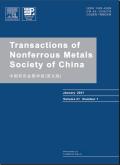Microstructure and properties of Cu matrix composites reinforced with surface-modified Kovar particles
IF 4.7
1区 材料科学
Q1 METALLURGY & METALLURGICAL ENGINEERING
Transactions of Nonferrous Metals Society of China
Pub Date : 2024-10-01
DOI:10.1016/S1003-6326(24)66606-9
引用次数: 0
Abstract
The thermal conductivity of Cu/Kovar composites was improved by suppressing element diffusion at the interfaces through the formation of FeWO4 coating on the Kovar particles via vacuum deposition. Cu matrix composites reinforced with unmodified (Cu/Kovar) and modified Kovar (Cu/Kovar@) particles were prepared by hot pressing. The results demonstrate that the interfaces of Cu/FeWO4 and FeWO4/Kovar in the Cu/Kovar@ composites exhibit strong bonding, and no secondary phase is generated. The presence of FeWO4 impedes interfacial diffusion within the composite, resulting in an increase in grain size and a decrease in dislocation density. After surface modification of the Kovar particle, the thermal conductivity of Cu/Kovar@ composite is increased by 110% from 40.6 to 85.6 W·m−1·K−1. Moreover, the thermal expansion coefficient of the Cu/Kovar@ composite is 9.8×10−6 K−1, meeting the electronic packaging requirements.
用表面改性科瓦颗粒增强的铜基复合材料的微观结构和性能
通过真空沉积在 Kovar 颗粒上形成 FeWO4 涂层,抑制了元素在界面上的扩散,从而提高了 Cu/Kovar 复合材料的导热性。通过热压法制备了用未改性(Cu/Kovar)和改性 Kovar(Cu/Kovar@)颗粒增强的铜基复合材料。结果表明,在 Cu/Kovar@ 复合材料中,Cu/FeWO4 和 FeWO4/Kovar 的界面表现出很强的结合力,并且没有产生第二相。FeWO4 的存在阻碍了复合材料内部的界面扩散,导致晶粒尺寸增大,位错密度降低。对 Kovar 颗粒进行表面改性后,Cu/Kovar@ 复合材料的热导率提高了 110%,从 40.6 W-m-1-K-1 提高到 85.6 W-m-1-K-1。此外,Cu/Kovar@复合材料的热膨胀系数为 9.8×10-6 K-1,符合电子封装要求。
本文章由计算机程序翻译,如有差异,请以英文原文为准。
求助全文
约1分钟内获得全文
求助全文
来源期刊
CiteScore
7.40
自引率
17.80%
发文量
8456
审稿时长
3.6 months
期刊介绍:
The Transactions of Nonferrous Metals Society of China (Trans. Nonferrous Met. Soc. China), founded in 1991 and sponsored by The Nonferrous Metals Society of China, is published monthly now and mainly contains reports of original research which reflect the new progresses in the field of nonferrous metals science and technology, including mineral processing, extraction metallurgy, metallic materials and heat treatments, metal working, physical metallurgy, powder metallurgy, with the emphasis on fundamental science. It is the unique preeminent publication in English for scientists, engineers, under/post-graduates on the field of nonferrous metals industry. This journal is covered by many famous abstract/index systems and databases such as SCI Expanded, Ei Compendex Plus, INSPEC, CA, METADEX, AJ and JICST.

 求助内容:
求助内容: 应助结果提醒方式:
应助结果提醒方式:


